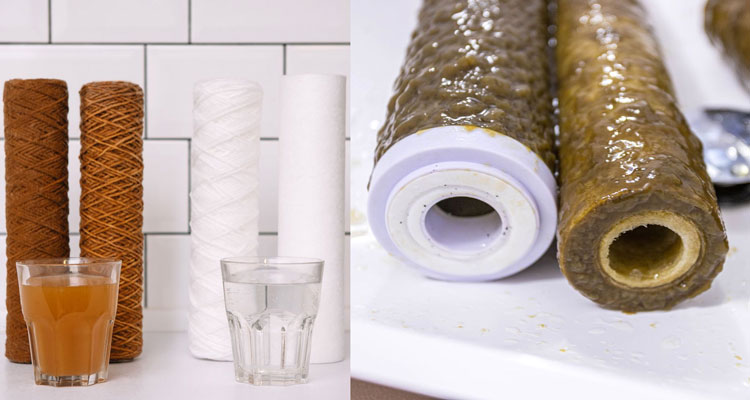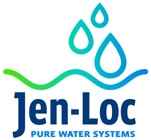SULFUR


How does Zeolite work?

Should I test my water?
Does your water have a rotten egg odor?
It may not be sulfur.

Left: A combination of iron and manganese creates an odor similar to rotten eggs, but how you treat it is quite different than sulfur. Most everyone has some degree of hardness and some degree of iron in their water.
Right: Filters with iron related bacteria. The more we delve into the problem, we are finding that IRB (iron related bacteria) is the culprit — and not being addressed correctly. The bacteria create a slimy layer to protect them, as they die off the decomposing bacteria creates an odor.
There are five causes of sulfur-like odor in water. Each is usually treated differently. Jen-Loc treats them all!
Hydrogen-sulfide gas
This is truly sulfur in the water, introduced to the aquifer by decayed vegetation millions of years ago. When aerated by a faucet, shower head, toilet or open hose, the water expresses the gas odor.
A quick test is to run water until cold and fresh. Draw a glass of water and take to another room. Come back to the room in 15-30 minutes and check to see if there is any odor in the room or right next to the glass. If there is no odor, you most likely have sulfur.
Traditionally, granular activated carbon (GAC) or filtering with aeration have been used to treat hydrogen-sulfide gas. But GAC has a very limited life span and if there are other contaminants in your water such as uranium, arsenic or radon, they will adhere to the outside of GAC, turning the filtering media into hazardous waste — waste which will require a specific protocol for disposal.
Jen-Loc’s natural zeolite is a longer lasting and safer solution. Zeolite adsorbs contaminants to the inside, encapsulating them. The spent zeolite is certified non-hazardous and safe enough to dump out in a vegetable garden.
Iron and manganese
Water sources in many areas of the country have some degree of hardness (calcium and/or magnesium carbonate) and some degree of iron. In certain areas there are pockets of manganese, which when combined with iron create a sulfur-like smell. It’s not sulfur! Depending upon the severity of the contamination this can be removed with man-made resin in a softener system or with GAC (though very inefficiently).
Better still, just use the Jen-Loc system!
IRB — Iron Related Bacteria
New England — our home — is a largely agricultural area. This introduces bacteria to the aquifer that multiply and travel to wherever they find an opening, such as a drilled or dug well. (The bacteria is unpleasant, but not a threat to health.) They create a layer of slime that protect the bacteria. The sulfur-like odor is the smell of their little bodies decomposing.
For an easy test, take the lid off of a toilet tank and feel in and along the plastic and sides. Does it feel slimy? If so, you may have iron related bacteria (IRB). If it feels gritty, probably not. A faint pink to deep orange staining on shower curtains and a slimy feel are also positive matches for IRB.
If IRB is the culprit, the best course of action is to perform a salt-chlorination on the source and house plumbing system — a thorough 24-48 hour process. While that will not completely eradicate IRB, it will clear out the concentrated buildup and keep it at bay until the next dosing. Traditional treatments rarely succeed, and even Jen-Loc will struggle a little with this if steps aren’t taken to limit it -the slime will cover the honeycomb filtering structure. When concentrated IRB is removed from the raw water then it has a far better opportunity to easily filter out contaminants.
Fouled Anode rod
If you have a sulfur-like odor in the hot water only you may have a fouled anode rod. This is more common in areas where water tends to be more acidic. This breaks down the rod — sometimes quickly — causing the rotten egg odor. If this is the case, order a new anode rod made of zinc, aluminum or a combination of the two. That should solve the problem.
Fouled sink hose or overflow drain
Is there is smell at one sink or toilet but nowhere else in the house? You may have a fouled sink hose or overflow drain. Braided metal hoses are susceptible to bacteria growth. An overflow in a sink introduces bacteria there so that when water runs it pushes air back out of the overflow and right into the bowl — where you are typically bent over washing your face or brushing your teeth.
Sulfur odor and the Jen-Loc solution.
We have customers who have the first three problems at the same time! Jen-Loc’s system has successfully removed odors and contaminants from their water. At an adult day care facility using 1,200 to 2,000 gallons of water per day we installed a set of 16” commercial surgical steel zeolite-filled canisters. The media is replaced every 6 months, to stay ahead of breakthrough contamination which is exceptional under the circumstances to be able to successfully treat over 180,000 gallons when nothing in the past had completely solved all challenges. It took almost 9 months to completely disintegrate and remove 20 years of buildup. This usage helped us to create our “What To Expect” document for cartridge lifespan, but there is even more life out of them when you spread it on your lawn to absorb acid rain or excess nitrates! For this customer, the cost for the media and the labor to change is a tiny fraction of what they had been using — unsuccessfully!
The systems that we sell for residences use pre-filled filter cartridges that are super easy to change, inexpensive and last longer. (You’ll know it’s time when there is 18-25 PSI loss on the gauges above the filter.) We offer several configurations and sizes. Some are “polishers” and some are “point of entry.” Our customers have a natural, eco-friendly solution to contamination from PFAS, uranium, arsenic, radon, hardness, iron, manganese, as well as sulfur and sulfur-like odors.
Our units are wall mounted which frees up space too!
Get your water tested!
Every water source is different and presents different water quality challenges. There is no hard and fast rule of how long a cartridge may last or how to configure your Jen-Loc system and cartridges in a newly installed system in an existing structure may be depleted faster as the system flushes out years of contamination.
It’s important to have your raw water tested to identify what’s causing problems and to help determine the optimal filter system to fix your water problems. As always, we’d be happy to help. Call us at 802-626-0913.
